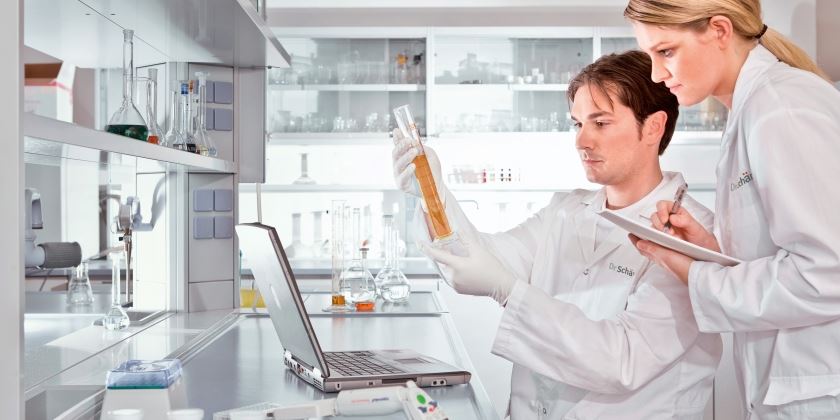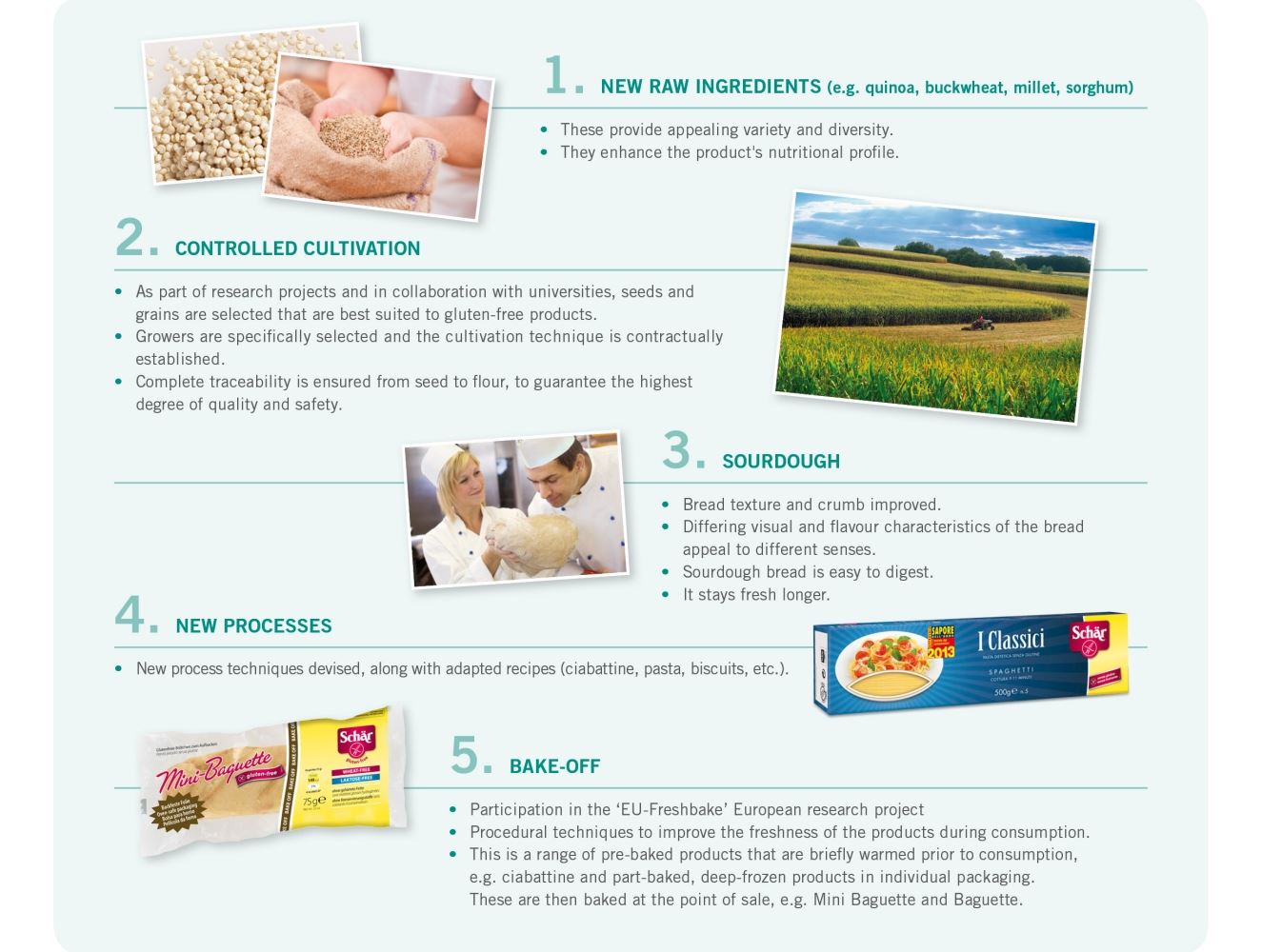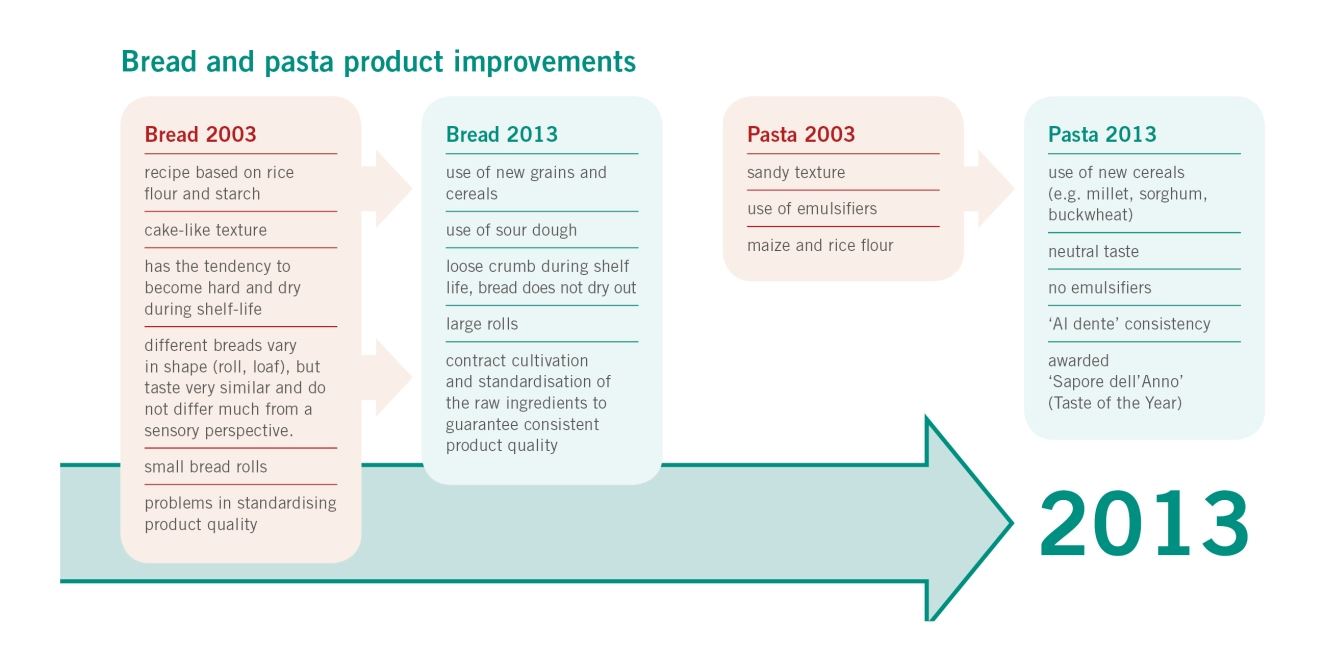R&D 2003–2013: From research to product development

At the end of 2013, the Dr. Schär Research and Development Department celebrated it's tenth anniversary. Virna Cerne, head of the R&D centre sets out the milestones of the last few years – in particular how the quality of gluten-free products has improved and gives a view on what might be expected in the future in this exciting market.
The task of the Dr. Schär R&D Department is to develop Dr. Schär gluten free products that fulfil the requirements of a balanced diet, as well as to counter the problematic eating habits of our time. We are increasingly developing products that meet society demands including convenience and making gluten-free eating out easier. A key objective is to develop tasty easy-to use gluten free foods that improve compliance with the gluten free diet.
Research is fundamental to all product quality improvements. In the last ten years numerous projects have been initiated to achieve and maintain this improvement in quality, including basic research investigating new raw ingredients, sensor technology, packaging and the development of new product technologies. Research and development must constantly be at the forefront to develop innovative products and improve existing ones.
Research is fundamental to all product quality improvements. In the last ten years numerous projects have been initiated to achieve and maintain this improvement in quality, including basic research investigating new raw ingredients, sensor technology, packaging and the development of new product technologies. Research and development must constantly be at the forefront to develop innovative products and improve existing ones.
Formation and evolution of the R&D department
Since 2003, the R&D department has been located in the Area Science Park in Trieste, Italy, so that staff can concentrate on effective development work in a suitable environment, surrounded by researchers. Prior to this, the R&D department was part of quality assurance. Investment in laboratory equipment and in personnel has been crucial. From an initial three researchers, there are now twelve members of staff in Trieste, with a further eight at other production sites responsible for the continuous improvement and development of gluten-free products. The number of projects managed by the team has increased significantly in the last ten years: from almost ten at the beginning to the current 30 development projects, around eight research projects and five technology projects.
Anniversary symposium
To give the public an insight into the work of the R&D department, on the occasion of its tenth anniversary, Dr. Schär held an international symposium in Trieste. Whilst most sessions were on the subject of gluten-free or coeliac disease, the focus of this symposium was scientific research into the field of gluten-free products and nutrition. Participants experienced first-hand what goes on behind the scenes of R&D, current projects being worked on and the most successful long-term studies now entering daily production. The agenda also covered alternative cereals grains, such as millet, sorghum, buckwheat, quinoa, teff and oats. All these cereals enhance gluten-free foods in a natural way and broaden the otherwise very limited menu for the patients. Use of these ingredients in gluten free products improves not only their appeal, but also their nutritional value. Buckwheat and millet have become firmly established ingredients used within the Dr. Schär range.
The milestones of the R&D department
Various components have contributed to the complete change to the range and quality of gluten-free products in the last ten years:


Significance of research in the future
Research on continuous product improvement will play a major role in the future for Dr. Schär. Collaboration with universities and other research centres is important for the successful implementation of projects. Attention is placed on the quality of raw ingredients as the basis for sensory appeal and optimal nutrition. The cereals used, controlled cultivation and cultivation conditions, processing and safety assurance in relation to gluten-free status are essential factors for high-quality products. R&D is and remains a driving force which will become more significant in a strongly competitive market. The future challenge will be to maintain the lead through impressive product quality.
Gluten-free – not just for those with coeliac disease
In the future there may no longer be a difference between products for those with or without coeliac disease. As a result of the changed regulation that moved the gluten-free category from diet products (9/398 EEC, amended by 2009/39) into EU 1169/2011 (REGULATION EU NO. 1169/2011 OF THE EUROPEAN PARLIAMENT AND OF THE COUNCIL on the provision of information to consumers), gluten-free products are effectively treated in the same way as general foods. Dr. Schär will concentrate on designing a variety of nutritious products which provide an alternative for coeliac and gluten sensitive patients enabling them to follow a balanced, gluten-free diet. It will be the task of the Research and Development Department to develop flavoursome products with consistent quality.
Author
VIRNA CERNE
- Head of the Dr. Schär Research and Development Department in the Area Science Park, Trieste, Italy
www.drschaer-institute.com
